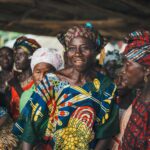Nigeria is a melting pot of beautiful cultures, religions, languages, and traditions.
With an estimated 370 tribes, it’s no wonder that there are dozens of wedding traditions and rituals scattered throughout the country and among Nigerians.
There are several religious groups throughout Nigeria, but the primary religions are Christianity and Islam.
That’s why you’ll see a blend of African and Western cultures in Nigerian wedding ceremonies and receptions.
14 Nigerian Wedding Traditions and Rituals
Nigerian weddings are lively, colorful, and large, no matter what tribe or religion the bride and groom belong to.
Before you attend, here are 14 Nigerian wedding traditions and rituals you might want to learn about.
1. No Guest List
Regardless of the tribe, the motto for Nigerian weddings tends to be the more, the merrier. Many Nigerian weddings have over 250 guests. When someone in the family or community is getting married, everyone’s invited. It’s a massive milestone in Nigerian culture, and the more people attend, the more blessings for the couple.
While there are people the couple will personally invite, they usually don’t create a guest list and welcome anyone who wants to attend. Of course, this will vary from couple to couple, but not having a guest list is very common in Nigerian weddings.
2. The Dowry or Bride Price
Across most tribes, Nigerian men provide a dowry or bride price before the marriage takes place. It’s usually a set amount of money or items. It can be cattle, vegetables, fruits, handmade goods, and anything the man and bride’s family agree upon.
There are a lot of negative connotations around a dowry, but in Nigeria, it’s not negative. It’s looked upon as a symbolic gesture to prove that the groom is capable of caring for the bride and their potential family financially.
3. Two Ceremonies
Nigerian weddings traditionally have two different ceremonies. There’s a primarily religious one. It can be at a religious site, with an officiant from the same religion, etc. Another is more cultural with classic Nigerian components.
Not every Nigerian wedding has two ceremonies, but many opt to have two ceremonies to immerse their marriage in both aspects. They usually have two separate officiants.
4. Gele
One of the main elements of a Nigerian bride’s attire is the Gele. A Gele is an embellished headpiece. They’re almost always custom-made to match the bride’s clothing and style. Not only does the bride wear a Gele, but often, her bridesmaids will follow suit. They also wear a custom-made Gele to coordinate with the bride, but it’s not identical.
5. Alaga
An Alaga is traditionally a woman officiant who comes to the Nigerian wedding to heckle the groom and his friends. It might sound a little odd, but it’s very entertaining, and guests love to watch it.
The Alaga usually performs with music and dances around, making it almost feel like a live theater performance. This traditional component of a Nigerian wedding can also be the officiant or MC. They help keep everyone engaged during an hour-long wedding ceremony.
6. Proposal and Acceptance
Before a Nigerian groom can get married to his bride, he has to propose to the bride’s parents and gain their acceptance. They typically write a letter to the parents with their intentions with their daughter.
Once the family receives the letter, they will read it out loud to the whole family and decide if they will accept the proposal. If they do, the family will give their acceptance to the groom on behalf of the entire family.
7. Prostration
Prostration is a tradition in Nigerian weddings where the groom and his groomsmen will honor the bride’s family. They do this during the wedding ceremony by laying down on the ground with their faces at the feet of the bride’s immediate family.
While it might seem weird and degrading to have the groom and his groomsmen prostrate, it’s the main way for them to earn the respect of the bride’s family and thank them for raising their soon-to-be wife.
8. Food Served by the Bride’s Family
Food is one of the best parts of any wedding, but there’s a rule that no person leaves the wedding hungry at a Nigerian wedding. You’ll see generous portions of traditional Nigerian food like jollof rice, meat pies, samosas, and more. Nigerian weddings have plated dinners or buffets, which are up to the bride’s family.
Another tradition about the food served at Nigerian weddings is that the bride’s family almost always prepares it. The bride’s mom and family will make the whole meal in their kitchen usually.
9. Aso-Ebi
In English, Aso-Ebi means “the family clothes.” So the bride and groom will choose a color scheme that all family members will follow when choosing attire for the wedding ceremony and reception.
The bride’s side will have a color, and then the groom’s side will have something different. It’s the easiest way for guests to tell who’s related to the bride and who’s related to the groom. The Yoruba tribe is who started this tradition, but it’s spread to other Nigerian tribes.
10. Kola Nut Ceremony
The Kola Nut Ceremony is a ritual many Nigerian tribes participate in at some point during the wedding. Elders will bless the kola nuts from a kola tree before the bride and groom break the nut. This ritual symbolizes the elders welcoming all the wedding guests and prosperity. The more pieces the nut breaks into, the more prosperity the visitors and wedding hosts will receive.
11. Money Spraying
Money spraying is one of the best Nigerian wedding traditions. Once the reception starts, guests will “spray” money at the bride and groom. This occurs sometime during the reception, and guests on the dance floor will surround the couple.
Lively music is played during the money spraying to get everyone in the party mood. The couple will dance, and the longer they dance, the longer the money spraying lasts and the more money they’ll get. It symbolizes good fortune for their new marriage.
12. Igbo Wedding
One of the main types of weddings in Nigeria is an Igbo wedding. This wedding usually starts with an Igbo man going to the woman’s home with his father and male relatives to announce their intentions to marry a woman. They also bring gifts to offer the bride’s family.
Once the bride’s family accepts the dowry, there’s the ritual of wine carrying. It’s a fun event where the bride searches for her soon-to-be husband in a crowd of other men. She’ll need to find her fiancé and then offer him the wine once she identifies him. Successfully placing her finance signifies them being married, and the party begins.
13. Yoruba Wedding
When we say Nigerian weddings are big, we mean large. Yoruba weddings are the largest compared to other tribes, with the number of guests ranging anywhere from 200 to 1,000. They traditionally have two MCs, one woman from the bride’s side and one from the groom’s side.
In Yoruba weddings, the bride’s family will question the groom while he prostrates, and once the prostration is over, the bride will enter the ceremony. She’ll place a traditional hat on his head, and he carries her down the aisle where rings are exchanged.
14. Hausa Wedding
In Hausa weddings, the name of the dowry is Kayan Zander. With this Nigerian tribe, the lower the bride price, the more blessings the couple will receive. The actual wedding day for this type of wedding is referred to as Fatihah, where both families of the couple will exchange vows, not the bride and groom.
The third event in a Hausa wedding is for women only. It’s known as Wuni, and the bride spends time with her female relatives and friends, where they get beautiful henna art on their hands. During this time, the groom will negotiate with the women for them to “release” the bride before the reception.
Frequently Asked Questions
Besides learning about the beautiful traditions and rituals of Nigerian weddings, there’s still much to learn. If you’re still curious about what makes Nigerian weddings unique, here’s what others are asking.
Why are there three Nigerian weddings?
There are three main Nigerian weddings because of the three main tribes throughout the country: Igbo, Yoruba, and Hausa. All are different from one another, but they’re all considered traditional Nigerian weddings.
Why do Nigerians give money at weddings?
Giving money at weddings comes from the Yoruba people, but many other tribes have adopted the tradition. It’s to symbolize good fortune and happiness for the newlyweds. It’s also a way for guests to show their affection for the bride and groom.
What color does the bride wear to a Nigerian wedding?
The color isn’t as crucial for a Nigerian bride as the traditional attire is. Christian brides will still likely wear a formal white gown before changing into conventional Nigerian attire later. Each bride is different, but it’s prevalent for them to wear white and switch to a colorful dress later.




